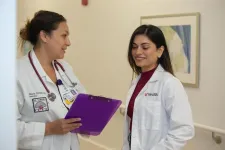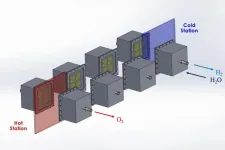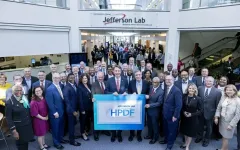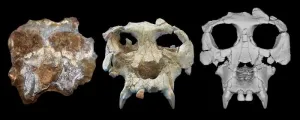(Press-News.org) Patients with a previous or current cancer diagnosis are more likely to have a stroke than the general population, but how are specific cancers and treatments associated with stroke risk?
A collaborative team led by University of Cincinnati, University of North Carolina (UNC) and Duke University researchers is seeking to answer that question.
Soma Sengupta, MD, PhD, now division chief of neuro-oncology at UNC, had the idea to study the prevalence of stroke in patients with different cancer types while a faculty member at UC. She recruited a team that included stroke experts Stacie Demel, DO, PhD, of UC and Wuwei Feng of Duke to put together a retrospective pilot study.
“This research question that crosses the stroke and neuro-oncology specialties is not a new question, but one that has been difficult to study,” said Demel, a physician-researcher at the UC Gardner Neuroscience Institute and associate professor of clinical neurology and rehabilitation medicine in UC’s College of Medicine.
Using databases of stroke and cancer patients, the team looked for a co-prevalence between certain cancer subtypes and stroke. While the sample size was too small to make any definitive conclusions, the researchers found a correlation between breast cancer and stroke risk that is greater than the stroke risk for the general population.
Sengupta said the pilot study results set the stage for a much larger study that will begin with present data and follow patients into the future, compared to the retrospective study that looked only at past patient data.
The prospective study will look at the co-prevalence of cancer types and stroke within a larger group of cancer patients at UNC’s Lineberger Comprehensive Cancer Center and the Duke Cancer Center, in collaboration with UC. The team will also aim to learn more about other factors beyond cancer diagnoses that may be contributing to increased stroke risk in cancer patients.
“There needs to be multiple sites looking at the set of causes of cancer in stroke, understanding the evolution and biology and designing better preventative measures,” said Sengupta, noting a similar project that is different in scope is underway at Memorial Sloan Kettering Cancer Center and Cornell University. “Our ultimate aim is to partner with StrokeNet for this research,” referring to the NIH-created network of 27 regional centers across the U.S. that conduct small and large clinical trials and research studies to advance acute stroke treatment, stroke prevention and recovery and rehabilitation.
Medical student involvement
Fourth-year UC medical student Rohan Rao was part of the pilot study research team and was first author of the published research after helping to draft the manuscript, clarify statistics and finalize the article’s review process.
“I have been fortunate to be a part of several research efforts at UC during my medical school experience thanks to the graciousness of faculty members across multiple departments, including Drs. Sengupta, Demel, Daniel Pomeranz Krummel, Andrew Steckl and Kevin Haworth,” Rao said. ”Research will undoubtedly be a large part of my career as it provides a creative outlet and, more importantly, an opportunity to make better outcomes for patients a reality.”
Rao has received several awards, including the 2024 Samuel Trufant & John Quinlan Award for Excellence in Neurology, the American Academy of Neurology’s Visiting Medical Student Scholarship and an Alpha Omega Alpha Honors society nomination. He is also continuing to work virtually on Sengupta’s research at UNC, including two projects focused on improving treatments for glioblastoma brain tumors.
“Both projects are in the field of ‘precision medicine’ which is the current trend in oncology, treating each patient’s tumor as an isolated entity rather than standardizing treatment as part of a larger disease,” he said.
With the knowledge and hands-on experience he has gained as a UC med student, Rao said he is applying for neurology residencies. He will learn where he will complete his residency at the College of Medicine’s Match Day in the spring.
“I am looking for a program which will provide me with an excellent general neurology foundation,” he said. “This will be important as I hope to pursue a neuro-oncology fellowship for which I will need to be well-versed in all neurologic diseases to treat common complications of brain tumors.”
Other pilot study coauthors include Abigail Koehler, Jane Khoury, Kiran Desai, Yehudit Rothman, Lalanthica Yogendran, Kathleen Alwell and Elizabeth Shaughnessy. Planned new collaborators on the prospective study include UNC’s Matthew J. Flick and Duke’s Dylan Ryan.
END
Learning more about how cancer affects stroke risk
University of Cincinnati to partner with UNC, Duke for large prospective study
2023-10-16
ELSE PRESS RELEASES FROM THIS DATE:
MIT design would harness 40% of the sun’s heat to produce clean hydrogen fuel
2023-10-16
MIT engineers aim to produce totally green, carbon-free hydrogen fuel with a new, train-like system of reactors that is driven solely by the sun.
In a study appearing today in Solar Energy Journal, the engineers lay out the conceptual design for a system that can efficiently produce “solar thermochemical hydrogen.” The system harnesses the sun’s heat to directly split water and generate hydrogen — a clean fuel that can power long-distance trucks, ships, and planes, while in the process emitting no greenhouse gas emissions.
Today, hydrogen is largely produced through processes that involve natural gas and other fossil fuels, ...
Fungal infection in the brain produces changes like those seen in Alzheimer’s disease
2023-10-16
Previous research has implicated fungi in chronic neurodegenerative conditions such as Alzheimer’s disease, but there is limited understanding of how these common microbes could be involved in the development of these conditions.
Working with animal models, researchers at Baylor College of Medicine and collaborating institutions discovered how the fungus Candida albicans enters the brain, activates two separate mechanisms in brain cells that promote its clearance, and, important for the understanding of Alzheimer’s disease development, generates amyloid beta (Ab)-like peptides, toxic protein ...
Jefferson Lab to lead $300+ million high performance data facility hub
2023-10-16
NEWPORT NEWS, VA – The U.S. Department of Energy has just announced the selection of Thomas Jefferson National Accelerator Facility as the lead for its new High Performance Data Facility Hub. Jefferson Lab will partner with DOE’s Lawrence Berkeley National Laboratory to form a joint project team led by Jefferson Lab. The HPDF will be a $300-500 million computing and data infrastructure resource that will provide transformational capabilities for data analysis, networking and storage for the nation’s research enterprise. ...
VA study provides new insights into COVID-19 pandemic death rates
2023-10-16
A multi-institutional team of researchers led by the White River Junction VA, and including the West Haven and Palo Alto VA, analyzed electronic health record data from more than 5.9 million Veterans―spanning both pre-pandemic (March 2018 - February 2020) and pandemic (March 2020 - February 2022) periods―to discover nuanced insights from COVID-19’s impact on mortality rates.
While former studies have primarily relied on aggregate data, this research―published in the October 2023 issue of the International Journal of Epidemiology―offered a unique perspective ...
Leading scientists, philosophers identify nature’s missing evolutionary law
2023-10-16
A paper in the prestigious Proceedings of the National Academy of Sciences today describes “a missing law of nature,” recognizing for the first time an important norm within the natural world’s workings.
In essence, the new law states that complex natural systems evolve to states of greater patterning, diversity, and complexity. In other words, evolution is not limited to life on Earth, it also occurs in other massively complex systems, from planets and stars to atoms, minerals, and more.
Authored by a nine-member team — leading scientists from the Carnegie Institution for ...
Study shows long-term health impacts after exposure to environmental disaster
2023-10-16
Exposure to a large-scale disaster, such as a tsunami, impacts population health over a decade later. A new study by an inter-disciplinary team of researchers in the United States and Indonesia has found that women who lived along the coast of Aceh, Indonesia when it was hit by waves from the 2004 tsunami have lower cortisol levels 14 years later than women who lived in other, nearby coastal communities that were not directly affected.
Cortisol is a stress hormone produced by the adrenal glands. Cortisol levels rise in response to stress as part of the fight or flight response, but consistently elevated ...
Extinct ape gets a facelift, 12 million years later
2023-10-16
A new study led by scientists at the American Museum of Natural History, Brooklyn College, and the Catalan Institute of Paleontology Miquel Crusafont has reconstructed the well-preserved but damaged skull of a great ape species that lived about 12 million years ago. The species, Pierolapithecus catalaunicus, may be crucial to understanding great ape and human evolution. The researchers describe their findings today in the journal Proceedings of the National Academy of Sciences.
Pierolapithecus catalaunicus, a species from northeastern Spain first described in 2004, was one of a diverse group of now-extinct ...
Signatures of the Space Age: Spacecraft metals left in the wake of humanity’s path to the stars
2023-10-16
WEST LAFAYETTE, Ind. – The Space Age is leaving fingerprints on one of the most remote parts of the planet — the stratosphere — which has potential implications for climate, the ozone layer and the continued habitability of Earth.
Using tools hitched to the nose cone of their research planes and sampling more than 11 miles above the planet’s surface, researchers have discovered significant amounts of metals in aerosols in the atmosphere, likely from increasingly frequent launches and returns of spacecraft and satellites. That mass of metal is changing atmospheric chemistry in ways that ...
Stress levels worse in women who have heart attacks with blockages, study finds
2023-10-16
Stress and depression are known to increase risk of heart attack, especially among women. They’ve also been linked to worse recovery. But does stress and depression contribute more to women with heart attacks with open arteries or blocked arteries? That’s what a new study published in the Journal of the American College of Cardiology aimed to find out.
Researchers found stress and depression were indeed common among women at the time of heart attack and for two months after. But they also found that women with heart attacks due to blockages (MI-CAD) in their coronary arteries had higher ...
The new robot is taking its first intuitive steps
2023-10-16
When walking on the sidewalk, a person is able to avoid puddles, other walkers, and cracks in the pavement. It may seem intuitive – and that's because it is.
There’s actually a biological component that allows humans and other mammals to navigate our complex environments. Central Pattern Generators (CPG) are neural networks that produce rhythmic patterns of control signals for limbs using simple environmental cues. When we quickly step away to avoid something blocking our path, that’s ...
LAST 30 PRESS RELEASES:
Scientists develop new gut health measure that tracks disease
Rice gene discovery could cut fertiliser use while protecting yields
Jumping ‘DNA parasites’ linked to early stages of tumour formation
Ultra-sensitive CAR T cells provide potential strategy to treat solid tumors
Early Neanderthal-Human interbreeding was strongly sex biased
North American bird declines are widespread and accelerating in agricultural hotspots
Researchers recommend strategies for improved genetic privacy legislation
How birds achieve sweet success
More sensitive cell therapy may be a HIT against solid cancers
Scientists map how aging reshapes cells across the entire mammalian body
Hotspots of accelerated bird decline linked to agricultural activity
How ancient attraction shaped the human genome
NJIT faculty named Senior Members of the National Academy of Inventors
App aids substance use recovery in vulnerable populations
College students nationwide received lifesaving education on sudden cardiac death
Oak Ridge National Laboratory launches the Next-Generation Data Centers Institute
Improved short-term sea level change predictions with better AI training
UAlbany researchers develop new laser technique to test mRNA-based therapeutics
New water-treatment system removes nitrogen, phosphorus from farm tile drainage
Major Canadian study finds strong link between cannabis, anxiety and depression
New discovery of younger Ediacaran biota
Lymphovenous bypass: Potential surgical treatment for Alzheimer's disease?
When safety starts with a text message
CSIC develops an antibody that protects immune system cells in vitro from a dangerous hospital-acquired bacterium
New study challenges assumptions behind Africa’s Green Revolution efforts and calls for farmer-centered development models
Immune cells link lactation to long-lasting health
Evolution: Ancient mosquitoes developed a taste for early hominins
Pickleball players’ reported use of protective eyewear
Changes in organ donation after circulatory death in the US
Fertility preservation in people with cancer
[Press-News.org] Learning more about how cancer affects stroke riskUniversity of Cincinnati to partner with UNC, Duke for large prospective study





